Education
BISU hosts seminars to promote cultural and tourism dialogue along Silk Road
The opening ceremony of the Advanced Seminar on Silk Road Cultural and Tourism Development and the Seminar on Enhancing Capabilities of Cultural and Tourism Research in Central Asian Countries took place at Beijing International Studies University (BISU) on Aug 3.
The opening ceremony was attended by leaders and officials from the China Intangible Cultural Heritage Protection Association, BISU, the Ministry of Culture and Tourism (MoCT), the Consulate General of the Republic of Uzbekistan, China Tourism Press, the Silk Road International University of Tourism and Cultural Heritage (Silk Road IUTCH), the China-SCO Institute of Economy and Trade, and Tourism Education Press.
The ceremony was chaired by Zheng Chengjun, a member of the Standing Committee of the CPC BISU Committee and vice-president of the university. Over 30 government officials, experts, and scholars from the Ministry of Culture and Tourism of the Republic of Uzbekistan, the local authorities in Samarkand, and Tashkent State University of Economics were invited to participate.
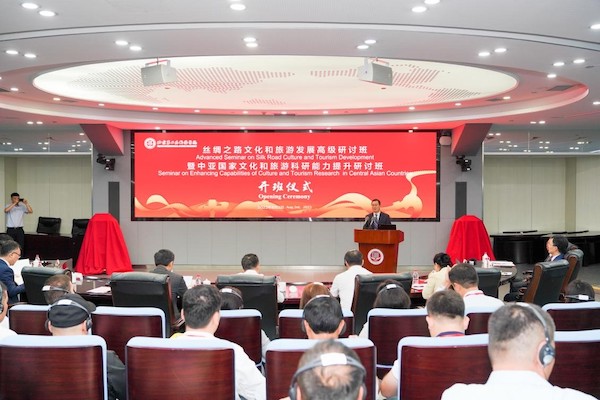
BISU Vice-President Zheng Chengjun presides over the opening ceremony.
Chang Yu, secretary of the CPC BISU Committee, extended a warm welcome to the attendees and emphasized that the Silk Road, as a historic bridge between Eastern and Western cultures, has facilitated international friendship and cultural exchanges, offering new opportunities for human civilization. He highlighted that the seminars not only serve as a vital academic platform for bilateral exchanges, but also exemplify the university's commitment to promoting cooperation in culture, tourism, trade, and investment between China and Central Asian countries.
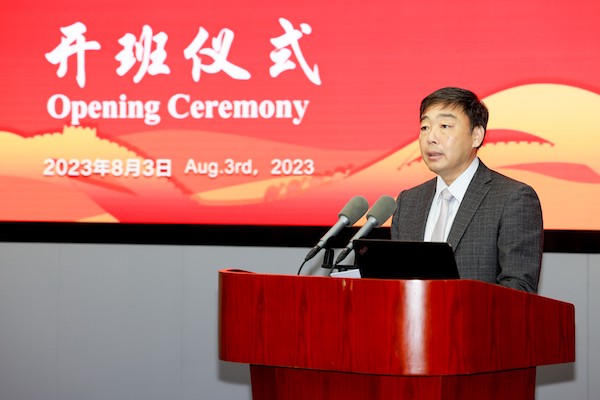
Chang Yu, secretary of the CPC BISU Committee, delivers a speech.
Cui Yinglan, a second-level inspector of the MoCT's Department of International Cooperation and Exchanges, said that the development of cultural and tourism industries relies on research and talent cultivation. The MoCT consistently supports academic exchanges and cooperation between China and foreign countries, especially in the field of culture and tourism.
During these seminars, participants will learn about China's valuable experiences in tourism development, hotel management, and cultural heritage preservation. They will explore different cityscapes, regional cultures, and the profound history of China, as well as experience the achievements brought by the Chinese model.
Cui said she hopes that the seminars would further enhance mutual exchanges and interactions in culture, tourism, and academia, contributing more wisdom and solutions to deepen people-to-people bonds and the high-quality development of the Belt and Road Initiative.
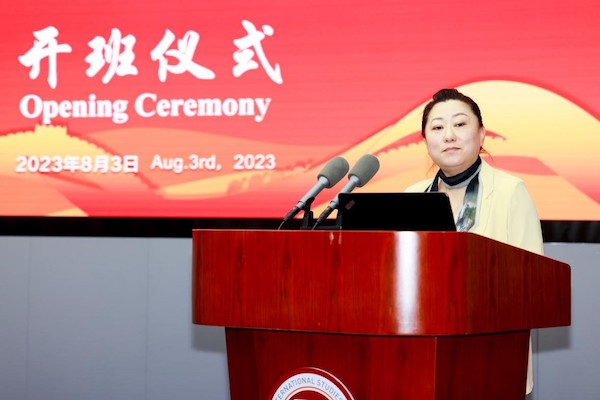
Cui Yinglan, a second-level inspector of the MoCT's Department of International Cooperation and Exchanges, delivers a speech.
Matkarimov Jakhongir Shamuratovich, deputy head of the Department of Education and Scientific at the Ministry of Culture and Tourism of the Republic of Uzbekistan, expressed gratitude for the warm invitation from BISU. He highlighted the importance of scientific education between the two countries under the Belt and Road Initiative, and praised the fruitful collaboration that saw the establishment of the Silk Road IUTCH, especially in the fields of education and research on tourism management. He emphasized that Uzbekistan values its tourism partnership with China and extends a sincere welcome to Chinese friends who wish to explore the beauty of the country.
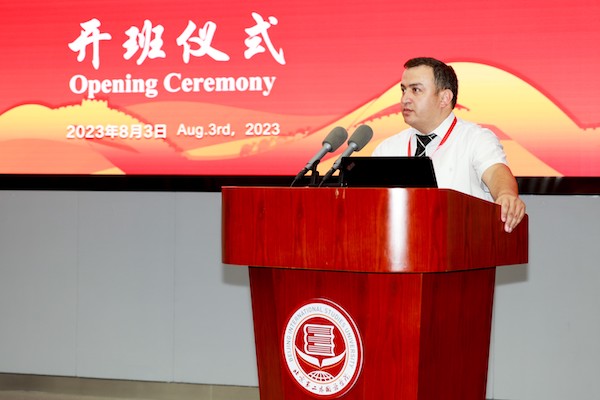
Matkarimov Jakhongir Shamuratovich, deputy head of the Department of Education and Scientific at the Ministry of Culture and Tourism of the Republic of Uzbekistan, delivers a speech.
Zou Tongqian, vice-president of the Silk Road IUTCH and assistant to the BISU president, summarized in his speech the rich potential for collaboration in the tourism sector with Central Asia, noting that the development of the tourism industry would contribute to economic growth in the region and enhance people-to-people exchanges among Shanghai Cooperation Organization member countries. He commended the Silk Road IUTCH for its innovative contributions to management systems and mechanisms, seeing it as a milestone for tourism and higher education in Central Asia.
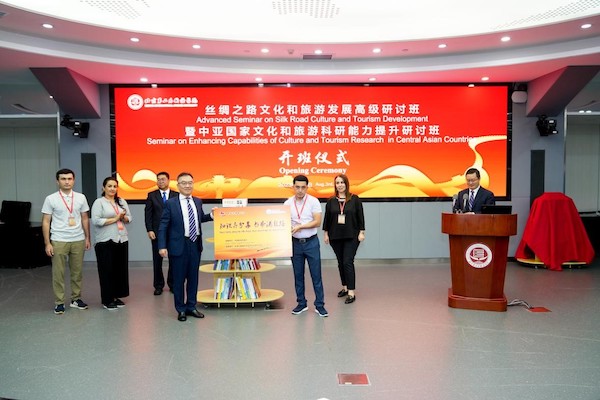
China Tourism Press donates books to the Silk Road IUTCH.
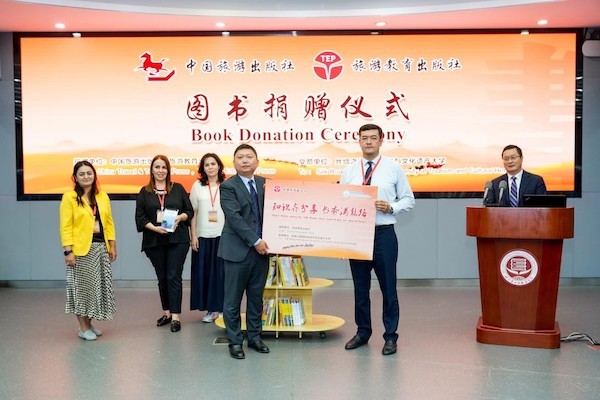
Tourism Education Press donates books to the Silk Road IUTCH.
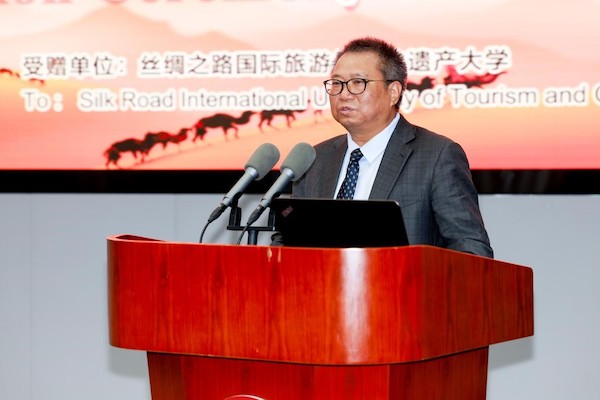
Zou Tongqian, vice-president of the Silk Road IUTCH and assistant to the BISU president, delivers a speech.
Jointly sponsored by the MoCT and the People's Government of Beijing Municipality, BISU is a renowned multi-disciplinary institution of higher education, offering courses such as literature, management, economics and philosophy, with foreign languages and tourism as its dominant and specialized disciplines.
The university's involvement in the joint establishment of the Silk Road IUTCH since 2019 has laid a solid foundation for deepening cooperation. The seminars are a transcultural academic event that exemplifies participants' commitment to mutual advancement and cooperation in culture, tourism, and research.
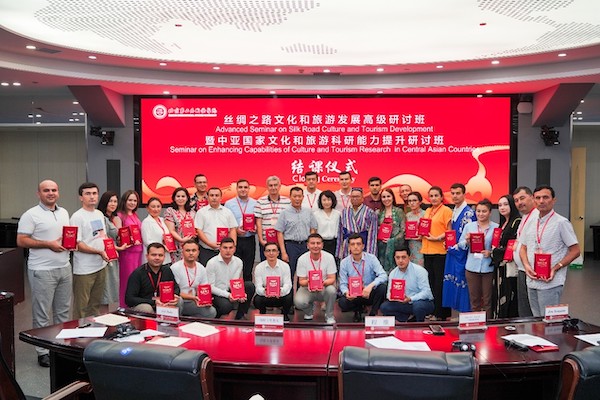
Cheng Wei, a member of the Standing Committee of the CPC BISU and vice-president of the university, presents graduation certificates to the participants.
From Aug. 3-10, participants engaged in academic exchanges and collaborative sessions at various notable institutions, including the Beijing office of the China-SCO Local Economic and Trade Cooperation Demonstration Area, Beijing Hospitality Institute, and the World Tourism Cities Federation.
Following this, from Aug. 10-15, they are set to embark on a trip to Shanghai and Xi'an. During this journey, they will engage with esteemed experts and scholars from Shanghai Institute of Tourism, Shanghai Business School, Xi'an International Studies University, and Northwest University. The primary objective of this trip is to fortify partnerships and deepen academic exchanges with these prestigious institutions, thus broadening and enriching the scope of their academic research.
This seminar serves as an invaluable platform, enabling experts and scholars from various countries to delve into academic discussions, and share their research insights. It not only fosters the free flow of ideas, but also bolsters mutual collaboration, paving the way for shared benefits. The initiative is pivotal in honing high-caliber, globally-oriented talents and fortifying the cultural and tourism-related ties between China and Central Asian nations. Furthermore, it epitomizes the shared commitment to forging a united future between China and Central Asia.

Copyright 1995 - . All rights reserved. The content (including but not limited to text, photo, multimedia information, etc) published in this site belongs to China Daily Information Co (CDIC). Without written authorization from CDIC, such content shall not be republished or used in any form. Note: Browsers with 1024*768 or higher resolution are suggested for this site.
Registration Number: 130349









